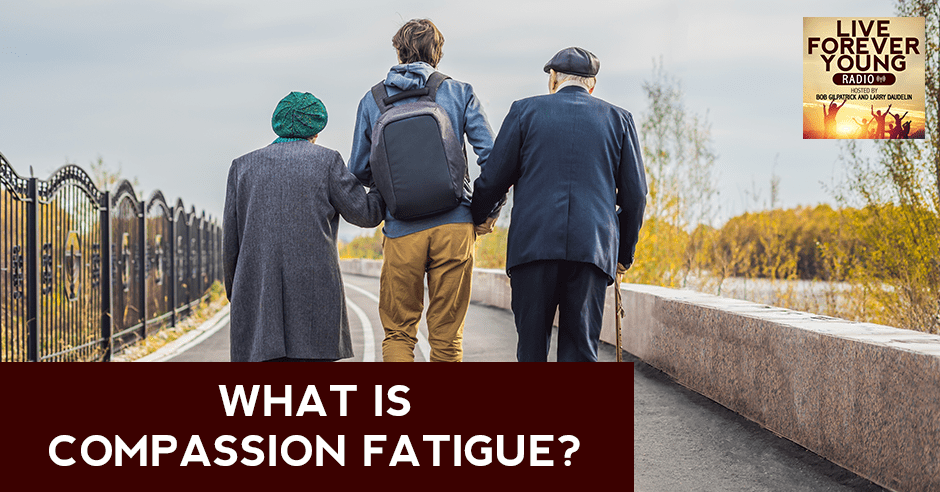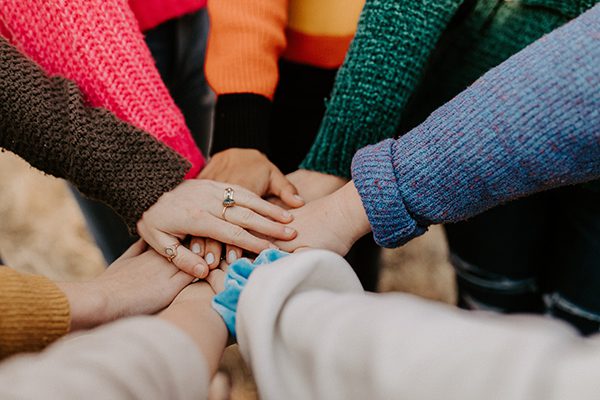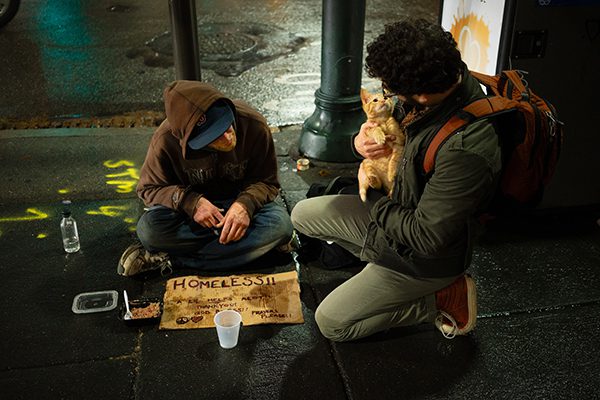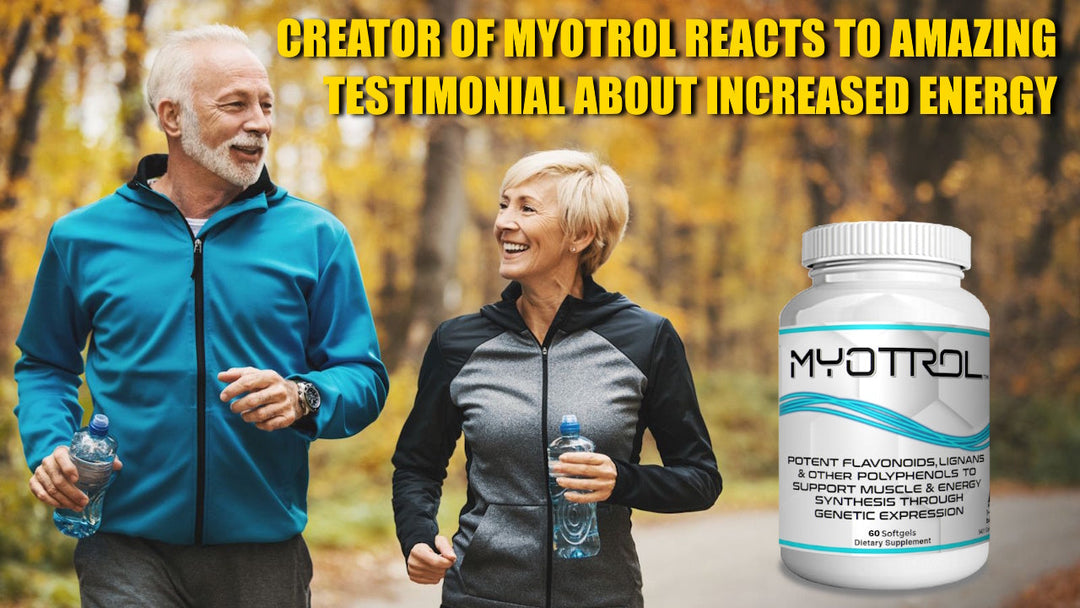What Is Compassion Fatigue?

Have you been running low on compassion lately? Well, you’re not alone. Compassion fatigue is a real phenomenon that many people are experiencing, especially now in our new COVID-19 society.
In today’s show, Bob Gilpatrick and Rollie Culp talk about this exhaustion of feeling and why we feel this way. They share their personal experiences with it and identify those who are most susceptible to it.
They also share some easy tips to help you retain compassion for others even when you are running low. Get yourself reenergized and ready to feel again. Tune in for more in this informative episode.
Watch the podcast here:
Listen to the podcast here:
What Is Compassion Fatigue?
An Emerging Phenomenon
I'm here with Rollie. How are you doing? I’m good, Bob. How are you doing? I’m good. I see you have your beautiful Tampa Bay Rays baseball team shirt on. We are nine and a half games up on almost every other team in our league. In the first place, cruising into the playoffs. This 2021, they're going to win the World Series. In 2020, they made it to the World Series. They're going to make it all the way to the end.
I have no doubt in my mind that they will be there in the World Series, winning it in 2021 because 2020 was a little bit of a letdown but that's okay. We still have lightning in the Tampa Bay box, but either way, one of the things that you don't feel a lot of because we win so often here in Tampa Bay is compassion.
That brings us into what we were going to talk about, which is a phenomenon called compassion fatigue. It's marked by emotional and physical exhaustion because you've spent all of your compassion and energy feeling for others. It's also marked by a diminished ability to feel that compassion. All your stores of compassion have been spent.
Some people call it the negative cost of caring and secondary traumatic stress. If somebody is sick and they're being cared for by a loved one or a healthcare worker, those people that are the caregivers can have this secondary trauma as well. They're so close to the one affected.
Both of us have worked in the medical field before. I’ve worked in nursing homes for over twenty years. In nursing homes, the people are very old and usually have only about six months to live when they get to the nursing home.
They're dying of old age. In large nursing homes where I worked, sometimes a person would pass away every day. There would be at least one person who passed away and a new person would come in a day later. After twenty years of it, you can see where maybe the response wouldn't be the same the first time when you first got there and had the first experience of family members that have come to collect belongings and things like that.
Do you mean it's like being employed at a nursing home? Yes. When I used to work at the oncology office down here in St. Pete, people would come in and you would see them the first time and you're like, “Here's a new person.” I remember when I first started working there, some of these people, even though they were sick, they got great personalities.
Even though most of them are unfortunately with a terminal disease and don't have a lot of time, they still have a lot of energy and interact with somebody. This is the one thing they get to do. You get used to them coming and you'd see them and then they wouldn't show up. I remember the first couple of times, I was like, “Man,” because I used to do the charts and help with the paper and the charts and everything, making sure everything was right and double-checking it. You'd be like, “We don't need this chart anymore.”
The first couple of times, you get affected by it. I was there for about three years and I remember it was like, “How many charts do we have to throw out today?" It's getting numb to that feeling. That's where this compassion fatigue comes in.
Also, in 2021 with COVID, it's complicated because it's been going on for over a year. There are people with differing opinions related to COVID. Some people are getting the vaccine. Some people don't want to get the vaccine. Some people think that this is a man-made virus. Other people think it's a natural thing that occurred.

Compassion Fatigue: Compassion fatigue is marked by emotional and physical exhaustion because you've spent all of your compassion and all of your energy feeling for others. It's also marked by a diminished ability to feel that compassion.
Either way, it's hurting everybody. Unfortunately, it creates this tension amongst people. You add in on top of that the people that have died from COVID and their family members. After a year and a half of it, this compassion fatigue can set in.
It's funny that you say that the idea of the difference of opinions leading to a lack of compassion, “That person passed away from the virus. I bet you they didn't have a vaccine. That serves them right.” That's not the kind of thinking that does any good, and that's a horrible example of compassionate fatigue, unfortunately.
The same thing that compounds it is the issue with masks because when people's faces are always covered, people aren't as human. You don't see their smile. “I'm not feeling good today.” You don't know how am I feeling about this person with the big mask on. I don't know. It blocks that whole social cue that would lead to whether or not you should feel good or bad, or if this person's feeling good or bad.
It’s hard to read their body language because a lot of it is in their face and it’s covered. There are a lot of things people can do to retain or regain their capabilities for compassion even in the midst of the most dire circumstance.
A couple of the things that we have talked about before, one of the ones I can think of that we did is to show how to use nonviolent communication. That's understanding what the person needs, how they feel before even trying to figure out a solution. A lot of the time, we'll try to rush to the solution without thinking about how we feel or whatever. You see that with the medical field like we were talking about before.
A lot of the time, doctors are like, “What's the problem? Is it the liver? We’ll get the liver and we'll pull it out of there.” Let's take a second and talk to the patient, “How are you feeling? Are you okay? Maybe it's more like your gallbladder or something.” It's not taking that time to listen or feel. This isn't always a good thing, especially in that particular case. To retain that, as a doctor, “How are you feeling today?” Listen before you respond.
There's a good book called Attending. In this case, it's not, “I'm an attending physician.” It's a book written by a doctor about how to attend to people, and using nonviolent communication from Marshall Rosenberg’s book. It's focused on other people's feelings. This can go a long way toward regaining your compassion. If you're just listening and you're interacting word to word, matter to matter, it's not conducive for compassion, but if I'm listening for your feelings, then that can lead to reconstituting your ability for compassion.
That's one of the hardest things. A lot of the time, we've had to say goodbye to people or get well to people or thank you to people. One of the things that you brought up, which I like, I got a handwritten letter from somebody, one of our customers, and it hit me here, but take the time to write something out and send it and mail it to somebody. That never happens anymore. Everybody gets a text or they get sent an email. “Didn't you get my email? I said thanks.” To take the time to grab a piece of paper and write, “Thank you so much,” and put it in the mail and send it. It's a major way to reconnect even without being able to be with the person.
This is one of the ways you can make people's feelings the most important thing. A lot of times, people are so busy. Research shows that 80% of the time during the day, people are busy doing little things that don't matter all that much. By refocusing on connecting with other people and focusing on their feelings, you're no longer majoring in minor things. The minor things are all these little busy things that might distract you from being truly present with somebody else. Related to this, there's a book called The 7 Habits of Highly Effective People. I read the one for teenagers when I was a kid, The 7 Habits of Highly Effective Teens.
The third habit is putting first things first. This is what we're talking about, majoring in minor things. Even Stephen Covey was saying, “Put first things first. Decide what's most important and do that.” In the fifth habit, he said, “Seek first to understand, and then to be understood.” The people that are the most effective leaders always listen to everyone else first.
They always speak last so that everyone else can speak and you get a chance to understand everybody. In this case of compassion fatigue, a lot of times, people are tired, so they want to get to the point and get moving. That's you needing to be understood, “I'm busy here. I got to get going,” but what about this person? We seek first to understand. The seventh habit, the last habit, is called sharpen the saw. Sharpening the saw can be learning new skills like nonviolent communication.
We were talking about how you get depleted. You need to sharpen up your tool of compassion. You need to re-energize it. You need to go out there and get it resharpened, and get yourself into a state of mind where you can not only focus on what you need, which usually always seems like the most important thing, but what others are asking for or need.
This is the time also when religion can be a place of refuge. In regard to compassion, the main religions that people follow are all talking about compassion. Love thy neighbor. Be a pure fountain of love, kindness and compassion.
One of the things is when you try to understand how to put yourself in other people's shoes, then you can finally see or realize what they're going through. A step further, recognize the God in them and you recognize them with the God in you. It's a heart-to-heart connection. The God that's animating me is also animating you. That's where we're meeting. Not in our busy mind stuff, but right here where we're animated by God.
No matter what we disagree on, we are created and we are going through with the same energy by the same life force so let us at least have that in common. Also, there's this phenomenon where people that are exposed to multiple experiences that were related to the same emotion over and over again can create this overreaction.
Somebody might be telling you a story about something that just happened to their sister, “My sister's in the hospital.” If you have had ten different things in the last ten days similar to this, all of a sudden, you're overreacting inside your own mind going, “I've had enough of this already. One more person I have to be compassionate for, I don't think I can do it.”
 Compassion Fatigue: By refocusing on connecting with other people and their feelings, you're no longer majoring in minor things.
Compassion Fatigue: By refocusing on connecting with other people and their feelings, you're no longer majoring in minor things.
This overreaction is a gestalt. You have certain events that evoke an emotion, and a similar event evokes the same emotion, and the emotion can be doubled or made worse. As it goes, you're feeling frustrated because of all the people that you have to show compassion for. This frustration builds. Sometimes it'll result in an outburst. That's when people say, “They're overreacting.”
They are, but this is a common human phenomenon. People are susceptible to this. It's good to know about it and it's also good to know that there are ways to erase this gestalt and start new again.
What you're talking about is a series of similar events that compound on top of each other. It’s like you're filling up this jar and once you get to the top, “I'm done. I’ve exploded. I’ve got no more room for this.”
That happens over time. If you were to go to a therapist, say someone who's trained in Neuro-Linguistic Programming or in hypnosis, they can take you back on your timeline and say, “When did this first happen? What happened the first time you felt this emotion?” You can reinterpret that event with a broader perspective and say, “The emotion that was evoked from that event,
I'm going to rewrite that. I'm going to redo that because now I have the help of a therapist to help me understand it. I'm going to interpret it differently and respond differently.” The unconscious mind doesn't know that that's what happens when you go back on your timeline and rewrite something. We've also talked in the past about revision scissors.
It sounds like the one where you cut out where you should have done better. I believe it was in a show called Habits to Help Seize the Day. It's a show we did before. You should check it out. We've got a lot of good tips like this, but this one is where we talk about let’s say you went going through the day and you reacted poorly to something that was minor like knocking the orange juice over.
You have a concentration moment at the end of the day and say, “What should I have done better?” You cut that out and replace it with your desired reaction, which would have been, “There's juice on there. Let me wipe it up.” The revision scissor, which was created many decades ago by Neville Goddard, was the precursor to modern-day timeline therapy. That's what you're doing.
This is a good skill to have and people can go back and read that show to learn to do it. Another thing is sometimes it's good if you are in a situation and you know that you need to bring forth your best compassionate self. It’s to be able to have a way to bring that upon demand. What you can do is you can think about a time when you were at your most compassionate. Perhaps it was something with a little child falling down, hurt their knee, and you were holding the child as it was crying. You cleaned off the cut on their knee, put a Band-Aid on it, and kissed their knee and made them all better. That would evoke a feeling of deep compassion.
You think back and focus on what it was that made you feel that way. You're thinking about how that kid must've felt. You’re thinking about, “What can I do to help him?” You're bringing that feeling of compassion out.
Once you get the feeling, you want to also think about other aspects of it. You say, “This is how I felt. What was I saying? What was the visual? What was the look on the child's face after they stopped crying? What was the look on my face when I was looking upon this child?” This is like making a visceral experience of this and you wanted them to give thanks for that time because that was your best you, and you're grateful for it. You want to say, “I'm thankful for this time.”
You also want to create an anchor. An anchor is usually a physical gesture, or sometimes a word or a sound that you are going to put or use. You're going to make this anchor and declare, “This is associated with that state. That elevated state of compassion is now tied to this.” It's called an anchor. In the future, if you're in a situation where you find yourself in an engagement and you're less than attending and compassionate, and you do this and you say, “Here's my compassion stance.
This is the anchor that puts me in that state.” The way that the human mind works is you can create these paired associations and it will bring up the same feeling that you had when you created that in your mind from the memory of being with that child.
Now, forever, this motion triggers that feeling of compassion to come up. It's called creating an anchor. This is a great thing because you now can further give thanks for this phenomenon for the idea of an anchor. The idea of saying thank you is a feeling of allowing for a gift to come to you or someone doing you a favor. It’s very powerful when you evoke the thank you into the anchor in this mood of compassion that you had.
You're thanking yourself for allowing you to return to that place. This is your elevated state of compassion. “I’m thankful for being able to tap into it.” It's our true us. People have this great ability for compassion. If someone sees an animal that's been injured, they will have compassion and help the animal. Same thing with each other. In this day and age, especially going back to February of 2020, all of a sudden, the world gets thrown into a tailspin where people begin to experience this fatigue.
These are some of the tips and tricks for how you can get it back, retain it, and make it your permanent state of being so that you're like that all the time.
It's easy to run out of compassion, especially with the way things are going now, but with the tools like being able to create an anchor and return to that spot, the NVC we talked about, remembering to not make a big deal about things that aren't that big of a deal. Don't major in minor things. These are simple techniques that you can easily use.
I thought of one other one. There is this visualization that people can use that is imagining a pitcher of water. This is a very clear glass pitcher and it has perfectly pure water in it and it's infused with compassion. Imagine that this is you. If you encounter someone and you can metaphorically pour compassion water on them, but it's you with your attitude and everything. Imagine that this is a magic pitcher. What am I going to do once I empty my pitcher, though?
 Compassion Fatigue: People have this great ability for compassion. If someone sees an animal that's been injured, they will have compassion and help the animal—same thing with each other.
Compassion Fatigue: People have this great ability for compassion. If someone sees an animal that's been injured, they will have compassion and help the animal—same thing with each other.
Imagine it's a magic pitcher and God is filling it with this pure water of compassion. Every time you pour, you lift it back up and it's magically full again. That’s the metaphor for you. I am giving compassion to you for something that you're going through, but it's never depleting because of my connection to the God source. God is always filling me up each time I give. That's a different attitude than, “I'm feeling tired from all this.”
Not only that but what also sparked this idea of compassion fatigue during the whole show is giving compassion shouldn't be hard to do. It should be something that comes from a place of pure love. To be able to tap into that is important.
Thank you very much for being here with me on this show.
Thank you, everyone, for reading.
Rollie and I will see you at the next show.






Leave a comment